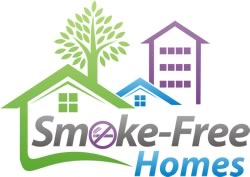

Smoke-Free Homes
 The Smoke-Free Homes project was a multi-phase initiative to design, test, and disseminate a brief smoke-free homes intervention. The first phase involved a randomized controlled trial in collaboration with the United Way of Greater Atlanta (UWGA 2-1-1). Line agents from 2-1-1 recruited 498 participants from the metro-Atlanta area to participate in the study. The intervention consists of four components: three mailings of educational print materials, including a tool-kit for creating a smoke-free home, and one coaching call designed to help participants create a smoke-free home using the 5-Steps outlined in the print materials.
The Smoke-Free Homes project was a multi-phase initiative to design, test, and disseminate a brief smoke-free homes intervention. The first phase involved a randomized controlled trial in collaboration with the United Way of Greater Atlanta (UWGA 2-1-1). Line agents from 2-1-1 recruited 498 participants from the metro-Atlanta area to participate in the study. The intervention consists of four components: three mailings of educational print materials, including a tool-kit for creating a smoke-free home, and one coaching call designed to help participants create a smoke-free home using the 5-Steps outlined in the print materials.
Our main outcome was the implementation of smoking bans in the homes and the related reduction in secondhand smoke exposure. Data were collected at baseline, three months and six months post baseline. Measures related to secondhand smoke exposure, smoking history, cigarette consumption, cessation attempts, household smoking rules, and readiness to quit smoking were assessed at baseline. A randomly selected subsample received an air nicotine monitor at 3-month follow-up to validate self-report of smoke-free home status. All data collected during the recruitment, screening, and baseline and follow-up were recorded using The Smoke-Free Homes Tracking Tool.
 Our results showed that more intervention participants made their home smoke-free than comparison participants. Due to the favorable results of the trial, we next conducted an effectiveness trial in North Carolina with the 2-1-1 agency delivering the intervention, followed by a second effectiveness trial in Texas which began in March 2014. Results from these trials showed even greater program effectiveness which led us to administer a National Grants Program to disseminate the research-tested Smoke-Free Home Program. The goal of our National Grants Program was to accelerate dissemination of the Smoke Free Homes intervention while systematically studying its implementation and effects in diverse 2-1-1 systems across the U.S. Research questions focused on barriers and facilitators of the implementation process. In addition, the California Tobacco Control Program has included the Smoke-Free Homes program in their grants program for community-based organizations. The intervention is listed on NCI’s RTIPs website at: https://rtips.cancer.gov/rtips/programDetails.do?programId=28303637
Our results showed that more intervention participants made their home smoke-free than comparison participants. Due to the favorable results of the trial, we next conducted an effectiveness trial in North Carolina with the 2-1-1 agency delivering the intervention, followed by a second effectiveness trial in Texas which began in March 2014. Results from these trials showed even greater program effectiveness which led us to administer a National Grants Program to disseminate the research-tested Smoke-Free Home Program. The goal of our National Grants Program was to accelerate dissemination of the Smoke Free Homes intervention while systematically studying its implementation and effects in diverse 2-1-1 systems across the U.S. Research questions focused on barriers and facilitators of the implementation process. In addition, the California Tobacco Control Program has included the Smoke-Free Homes program in their grants program for community-based organizations. The intervention is listed on NCI’s RTIPs website at: https://rtips.cancer.gov/rtips/programDetails.do?programId=28303637
In addition to the University of North Carolina and University of Texas Health Sciences Center we had a large number of partners on this project, including Washington University. We were guided by an Advisory Committee comprising 2-1-1 agencies in Atlanta, Houston, and North Carolina, along with state tobacco control programs in Georgia, Missouri, North Carolina and Texas. This program has been adapted for American Indian/Alaska Natives.
The Smoke-Free Homes Project was funded through the National Cancer Institute’s State and Community Tobacco Control Research Initiative, Cooperative Agreement # U01 CA154282.
For more information, visit our Smoke-Free Homes website.